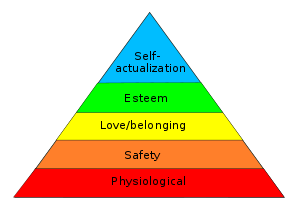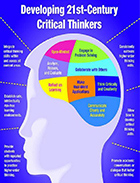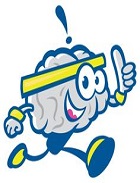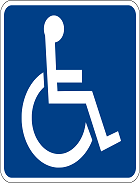Motivational theory in classrooms
Motivational theory in classrooms
Psychologist Abraham Maslow in his 1943 paper ‘A Theory of Human Motivation’ suggested that humans need to satisfy a series
 of needs before they can meet their full potential. The theory was later termed as ‘Maslow's hierarchy of needs’. In this hierarchy, he explains the needs that require fulfilment on different levels, in a diagrammatic pyramid.
of needs before they can meet their full potential. The theory was later termed as ‘Maslow's hierarchy of needs’. In this hierarchy, he explains the needs that require fulfilment on different levels, in a diagrammatic pyramid. Fulfilling child’s needs
In order for a student to perform well in class, there lies a series of needs that need to be fulfilled. They are as follows-
-
Physiological needs are required to be met to keep the human body functioning. Air, water, food and shelter are some of them. These are extremely important in every person’s life, for efficient functioning.
-
The second and the most important need is safety. Safety includes personal security, financial security, health and wellbeing, safety against accidents, etc. Safety not only implies safety at home, but also implies safety at school. Thus, schools need to provide an environment that ensures student safety.
-
The third level is the need to feel a sense of belonging and interpersonal space. It is important that students feel the need to make friends and to belong to certain friend groups.
-
Self-esteem is another need that has to be met to make students feel valued and respected. Children with low self-esteem tend to be less confident and doubtful about themselves and only with an effective teacher’s feedback can they improve on their self-esteem.
-
In order to achieve self-actualisation, all of the above needs need to be fulfilled. A teacher must not assume that a student will achieve his/her full potential as soon as he/she steps into class. Instead they need to be assessed and the issues that rises in between should be addressed appropriately.
How to achieve some of the psychological needs in classrooms?
To achieve psychological needs, water can be kept in classrooms to access when students feel thirsty. They can also be equipped with a few healthy snacks such as granola bars to keep the students active all day. Research says that students perform better when they are both hydrated and fed, enabling them to concentrate better. Similarly, a child who is sleep-deprived must be allowed to take a short nap or rest in case he/she feels sleepy. Sleep-deprived children tend to learn less when they are tired which also makes them less focused and lose concentration. It is also important to provide them with a safe learning environment that is free from bullying. Such measures help provide a change in the environment, thus helping students reach their fullest potential.





















